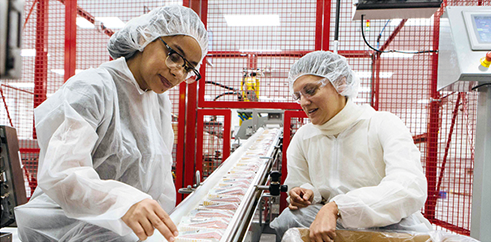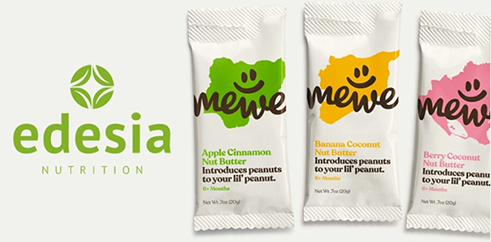Not many people can say they’ve saved millions of lives, but Navyn Salem is one of the few who can. Since 2010, this Nantucket summer resident has helped feed more than five million acutely malnourished children in forty-eight countries, often rescuing them from the brink of death. “I had absolutely no experience to take on this initiative,” she says, “but I knew if I didn’t do something, then children would die for no good reason.”
Salem leads us through her factory in North Kingstown, Rhode Island where she and her team of seventy work twenty-four hours a day, six days a week manufacturing Plumpy’Nut, a nutrient rich peanut butter paste that’s been compared to penicillin in its efficacy to save lives in the developing world. Plumpy’Nut is known as a ready-to-use therapeutic food, and if you ask experts at Doctors Without Borders or UNICEF, this specially designed peanut butter is as powerful as antibiotics in the fight to save human lives.
Invented by a French pediatrician who was inspired by the spreadable chocolate paste Nutella, Plumpy’Nut is a simple fortified peanut butter recipe that can last for up to two years without refrigeration and doesn’t require water to be consumed. Doctors can provide mothers with a two-week supply to be administered to their children at home, thus freeing up valuable hospital beds. Because peanut allergies are nearly nonexistent in the developing world, there’s little risk of a deadly allergic reaction. Within days of receiving the 92-gram, 500-kilocalorie packet, the children begin rapidly gaining weight and come back to life.
Salem first encountered Plumpy’Nut during a trip to Tanzania, where her father, grandparents and great-grandparents were born. When she returned home to the States, she happened to watch a 60 Minutes segment by Anderson Cooper about the way Plumpy’Nut was dramatically saving children’s lives in Niger and how there was a need for more of this peanut butter to be manufactured.
“What if we could make Plumpy’Nut in Tanzania?” she thought. “Then you’re using local raw materials, local resources, and you’re handing out paychecks while making something that saves lives.” And so with four children of her own and no experience whatsoever making peanut butter — let alone manufacturing tons of it — Salem opened her first Plumpy’Nut factory in Tanzania called Power Foods. For three years, the factory produced 3,000 metric tons of Plumpy’Nut that was distributed within Tanzania as well as in eight bordering countries.
In 2009, Salem moved her operation back to the United States by opening up a nonprofit factory in Providence and renaming her company after the Roman goddess of food, Edesia. The move was prompted by a USAID grant that could help champion her efforts. “We have been a recipient of this grant funding since the day we started manufacturing in 2010,” Salem says.
Prior to starting Edesia, Salem graduated from Boston College and then worked as a marketing executive for what became Monster.com. Her learning curve in designing and operating an industrial factory was steep. She relied on her partner, Nutriset, the French company that owns the patent to Plumpy’Nut, to help design her first factory in Tanzania and her second in Providence. However, the $18.5 million factory in North Kingstown, Rhode Island, which just opened a year ago this July, was designed entirely in-house.
“These are my kids,” she says, walking us past a series of giant photos that line the walls of her factory. “I can’t get their stories out of my head.” The photos were taken during her many service trips to places like Liberia, Sierra Leone, Niger, Ethiopia, Guatemala, India, Papua New Guinea, Cambodia and Haiti. “These are just some of the places where I have seen first hand what malnutrition looks like. These children began life at an extreme disadvantage simply as a result of where they were born.”
Salem directs our attention to two smaller photos mounted side-by-side on a clipboard. On the left is a painfully malnourished child lying helplessly on her back, her ribs pressed up against her skin, her face gaunt, legs and arms boney, and eyes sunken. And on the right is a perfectly healthy young girl, sitting upright with a beaming smile. “That’s just after seven weeks of her eating Plumpy’Nut,” Salem says. “To see a child, lifelessly laying in her mother’s lap, open her first packet of Plumpy’Nut, take a small taste, and start to perk up almost immediately… It’s like witnessing a miracle.”
Salem guides us through a smartly appointed cafeteria, the type you might expect at Google’s headquarters, and into a sprawling warehouse where towering steel shelves loom like city blocks. They’re stocked high, first with 2,000-pound super sacks of raw materials — peanuts, powder milk, sugar — and then with pallets of Plumpy’Nut, each destined for specific countries. Edesia’s orders come from the World Food Programme, UNICEF and USAID, each of which determines Plumpy’Nut’s recipients. “That truck is headed to the Sudan,” Salem says, nodding to one of the three loading docks at the backend of the warehouse. “Yesterday it was to Ethiopia. Tomorrow it will be Guatemala.”
Hanging above the loading dock are flags from all over the world, each representing the homeland of one of her employees. “They have so many stories,” she says. A bookseller from Baghdad. A Syrian who had to flee Aleppo for safety. A Sierra Leonean torn from his family during the war. A Tanzanian who spent seventeen years in a refugee camp. “Some employees are dedicated to our mission because they are alive today because of aid they received,” Salem says. “Some work for Edesia because they want to be a part of our mission, part of the action that results in saving lives.”
One of the biggest questions Salem fields is why she isn’t directing her efforts towards feeding hungry people living within the United States. She believes there is potential for products like Plumpy’Nut to help meet the needs of food pantries and food banks around the country, but insists that hunger in the United States is different than what she’s seen in the developing world. “We are working hard in our new innovation center to create new products that will be designed specifically for the nutritional needs of vulnerable Americans,” she says. “The needs are very different, so we need to be mindful of these differences while creating new formulations.”
Come this June, Salem will be returning to Nantucket where she runs Edesia’s operations remotely from her home on Eel Point during the summer. She and her husband, Paul, first met on the island in 1996 — the same year Plumpy’Nut was invented — and were married there three years later. Pivoting between the bounty of Nantucket and the desperation of the developing world, Salem is acutely aware of the great privileges in her life. “I am the luckiest person on the planet to be blessed with four healthy daughters, among so many other blessings,” she says. “And yet, the greatest gift I have been given is to have the opportunity to take action, to do something tangible that literally saves the lives of so many.”


For manufacturers and distributors, operational challenges are common, but Edesia Nutrition founder Navyn Salem also navigates government…